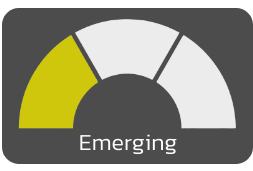
-
Understanding the commercial readiness scale
WTiN’s Commercial Readiness Scale gives an indication of what stage of commercialisation a product is at. It ranges from Emerging: a research stage development; Scaling: the product is being produced on a small but growing scale, and Commercialised: the product is well-established and ready to purchase.


A 2021 EU Horizon 2020 research and innovation project to develop a digital platform capable of transforming the sustainable credentials of the textile industry is now in the process of commercialisation. Otis Robinson reports.
The textile & apparel industry has “suffered a drastic reduction in performance over the last few decades”, writes a 2024 University of Manchester report.
The paper, titled The Fashion Big Data Business Model: A cloud platform for fashion value chain digitization transformation, puts forth the results of a recent European Union (EU)-funded project, which in turn offers a potential solution to several industry bottlenecks such as supply chain interruptions, unsustainability, supply chain ecosystem fragmentation and skills shortages.
“This disconnection leaves expertise and knowledge unexploited and presents no clear channels for recovery,” the report writes. “To improve competitiveness new tools are urgently needed to facilitate quick and comprehensive communication of expertise across the supply chain and to co-ordinate activity between all involved parties to [the] delivery of exemplary consumer personalised products.”
As such, in 2017, Professor Yi Li, author of the paper, began an EU-funded research project titled Fashion Big Data Business Model; FBD_BModel. Along with 15 partners, researchers at the University of Manchester created a platform-as-a-service (PaaS) portal with support from digital modelling and artificial intelligence (AI)-driven data services to “enable the digital transformation of fashion and textile companies towards real-time, people-centred, environmentally compelled business models”.
“It addresses the key problems of the fashion and textile industry, such as high rates of goods return, high inventory risk caused by high costs, waste creation, unsustainable consumption behaviours, and dissatisfaction of consumers,” writes Li in the report.
Fashion big data model
The project, which ran from 2017 to 2021, ultimately led to the development of a platform focused on uncovering new business models through the act of digitalising the whole supply chain.
By joining the whole business-to-business-to-consumer (B2B2C) value chain – from raw material to fibre production, to yarn and fabric dyeing, to garment design and distribution, to consumption – the platform was able to create a data-driven business model, says Li in conversation with WTiN.
In creating a full digital twin of the entire length of the supply chain, with additional considerations, AI algorithms were then utilised to help predict and support the next moves for a brand, with regard to the best economic and sustainable practices.
“We developed databases and computational models to link the whole supply chain together – models that could consider quality control, environmental footprints, digital certifications, potential for circularity, performance structure, product performance, distribution processes, intuitive branding and consumption patterns, too,” explains Li.
The actual aim of the project, says Li, was to enable full supply chain compliance to upcoming Green Deals – essentially, to create a technology platform to support the initiative and its roll-out across the industry. With full support from the EU’s Horizon 2020 research and innovation programme – and EU€3.76m (US$4.04m) funding acquired – the team began work over 39 months.
Today, years after the close of the project, the platform will see life once again. According to Li, the FBD_B Platform will now be commercialised by the University of Manchester team. This commercialised version of the platform is primed “to support small-to-medium-sized enterprises (SMEs) in the UK and EU textile and fashion industries”, supporting digitalisation strategies (including data services), product certifications and the roll-out of digital product passports (DPPs), says Li.
(Regarding DPPs, Li notes that a key concern – as highlighted by WTiN last month – is that even such a high level of digitalisation and transparency cannot not explicitly authenticate any green claims applied to products, nor validate the authenticity of their origin, and so traceability should also be a mandatory requirement in conjunction with transparency legislation.)
Testing and validating
Exemplifying the efficacy of the FBD_B Platform, Li says “the platform had been tested and validated by a number of companies in the project consortium and evaluated by [the] EU assessment panel”. He continues: “Very positive feedback was provided in the assessment reports. The University of Manchester FBD research team has been recognised as the key innovator in the project.
“We also created an impact case from within the University of Manchester,” says Li, referring to the aforementioned paper titled The Fashion Big Data Business Model: A cloud platform for fashion value chain digitization transformation, authored by Li alongside students Kuo Cao and Zhangchi Lui. The report details the “injection” of the intellectual property into a start-up company called Digital Clothing Ltd. “With the FBC platform,” the paper writes, “the team strives to engage with each stakeholder of the fashion textile industry to create a transparent and open system for effective material and garment functional performance design and inventory management, as well as material-to-product carbon footprint traceability.”
It further details an ongoing 2022 consultancy project with the Beyond Fashion Co Group to “digitise [its] fashion supply chain by using the FBD platform”, and a 2023 research contract with Unilever to “digitise and characterise the hand-feel and skin-touch comfort performance of apparel products treated with different fabric softeners” for the FBD platform.
For more information, visit www.fbd-bmodel.eu.
Have your say. Join the conversation and follow us on LinkedIn






